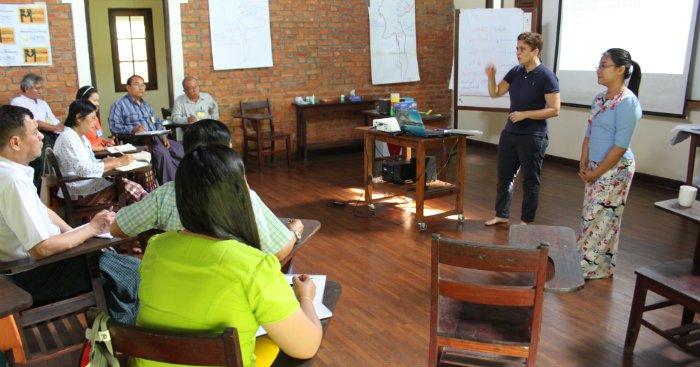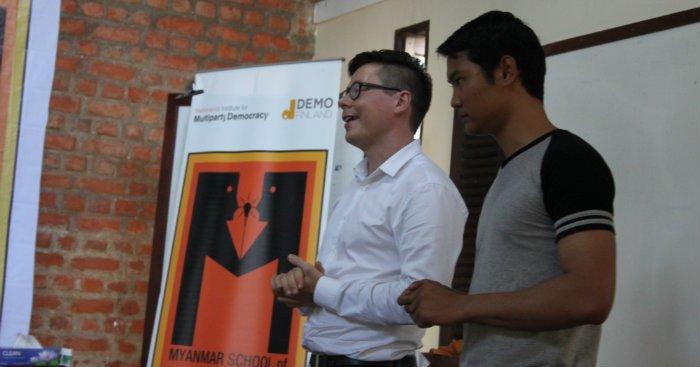“For politicians in Myanmar, speechwriting and speaking before their constituents are important skills. In a young democracy like Myanmar they must learn how to better communicate with citizens and deliver their message to their potential voters”, explains Programme Coordinator Kyaw Zay Ya at the Myanmar School of Politics alumni training weekend “The Art of Political Speech”.
“Through this, people can feel more represented and understand parties’ ambitions and policies. Parties can also promote and enhance freedom of speech and expression, which are fundamental rights of any democratic system”, he continues.
The five-day training organized at an eco-lodge near the city of Bago in December, is the fifth alumni weekend of the Myanmar School of Politics. These long weekends are in-depth courses on topics proposed by the participating politicians themselves, who all have attended the intensive four-week core course of the MySoP in their own state or region.
The first core course of MySoP was held in 2014 and since the number of alumni has risen to 116. “We have participants who have traveled all the way from the Chinese border and others from the southern tip of Myanmar, more than 1500 kilometers apart”, explains Bram Steenhuisen, Demo Finland and NIMD Country Representative in Myanmar. In total, 56 alumni from 22 different parties attended the training. “Almost all the parties we have worked with are here”, Steenhuisen adds.
MySoP uses a mix of local and international trainers to provide the participating politicians with the best available expertise. International peer-support and country comparisons offer valuable information and experience that can be used to consolidate democracy in Myanmar.
This time Finnish Member of Parliament Silvia Modig was invited to train the participants on speech delivery. “When giving political speeches, one must always remember that she or he is responsible for the content. But even the best speech is not effective, if it is not delivered with skill”, Modig says.
“It has been great to see the commitment and enthusiasm of the participants. Also, the co-operation between politicians coming from different parties and backgrounds is impressive. While practicing speechwriting and speech delivery, the participants also get to know each other, have time to reflect on their own and everyone else’s political viewpoints and policies, and will for sure find issues to co-operate on”, she continues.
Another Finnish trainer, Ville Tuominen from Communications Agency “Ellun Kanat”, guided the participants into the art of speechwriting. “In my opinion, a political speech is a brilliant tool in letting citizens know what you and your party stand for and why. But it is also a great way to spur discussion and invite people to join your cause. That is something we should emphasize also in Finland, to make a point that politics belongs to everyone, not only to the professional politicians”, says Tuominen.
“You could tell how much the participants appreciate the Myanmar School of Politics, and this kind of multiparty training could work in Finland as well”, he adds.
As Myanmar is currently taking its first steps as a multiparty democracy, all multiparty initiatives play a key role in building a constructive democratic culture.
“In the case of Myanmar, cross-party cooperation is so important because there are many issues that can be collaboratively solved by parties, such challenging issues as environmental degradation, peace and development, building schools and clinics in rural areas etc. Cross-party co-operation is needed to pave the way for building trust in the national-level peace process as well as furthering democratic practice in the long run”, tells Kyaw Zay Ya.
As words count as action in politics, the speeches politicians give all contribute to the future of democracy in Myanmar. “Over the past few decades, politicians have had little chance to give or listen to truly engaging, thought provoking and personal speeches. Because of the richness of the Burmese language and the immense raw talent of the new generation of politicians here, you see that people learn very quick and get hooked to creating a connection with the audience, the way a good speech does. These are very hopeful signs for the political future of Myanmar”, concludes Bram Steenhuisen.
The Myanmar School of Politics is a joint program by the Netherlands Institute for Multiparty Democracy and Demo Finland. Earlier, MySoP has published a speechwriting booklet based on a speech by Barack Obama’s speechwriter Jon Favreau with his support.



